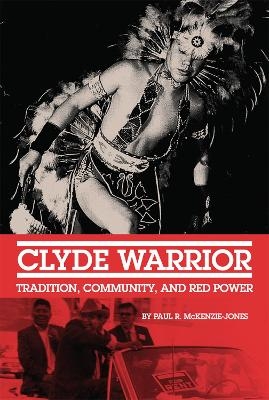
Clyde Warrior
Tradition, Community, and Red Power
Seiten
2015
University of Oklahoma Press (Verlag)
978-0-8061-4705-5 (ISBN)
University of Oklahoma Press (Verlag)
978-0-8061-4705-5 (ISBN)
The phrase Red Power, coined by Clyde Warrior in the 1960s, introduced militant rhetoric into American Indian activism. In this first biography of Warrior, Paul McKenzie-Jones presents the Ponca leader as the architect of the Red Power movement, spotlighting him as one of the most significant figures in the fight for Indian rights.
The phrase Red Power, coined by Clyde Warrior (1939-1968) in the 1960s, introduced militant rhetoric into American Indian activism. In this first-ever biography of Warrior, historian Paul R. McKenzie-Jones presents the Ponca leader as the architect of the Red Power movement, spotlighting him as one of the most significant and influential figures in the fight for Indian rights.
The Red Power movement arose in reaction to centuries of oppressive federal oversight of American Indian peoples. It comprised an assortment of grassroots organizations that fought for treaty rights, tribal sovereignty, self-determination, cultural preservation, and cultural relevancy in education. A cofounder of the National Indian Youth Council, Warrior was among the movement's most prominent spokespeople. Throughout the 1960s, he blazed a trail of cultural and political reawakening in Indian Country, using a combination of ultranationalistic rhetoric and direct-action protest.
McKenzie-Jones uses interviews with some of Warrior's closest associates to delineate the complexity of community, tradition, culture, and tribal identity that shaped Warrior's activism. For too many years, McKenzie-Jones maintains, Warrior's death at age twenty-nine overshadowed his intellect and achievements. Red Power has been categorized as an American Indian interpretation of Black Power that emerged after his death. This groundbreaking book brings to light, however, previously unchronicled connections between Red Power and Black Power that show the movements emerging side by side as militant, urgent calls for social change. Warrior borrowed only the slogan as a metaphor for cultural and community integrity.
Descended from hereditary chiefs, Warrior was immersed in Ponca history and language from birth. McKenzie-Jones shows how this intimate experience, and the perspective gained from participating in powwows, summer workshops, and college Indian organizations, shaped Warrior's intertribal approach to Indian affairs. This long-overdue biography explores how Clyde Warrior's commitment to culture, community, and tradition formed the basis for his vision of Red Power.
The phrase Red Power, coined by Clyde Warrior (1939-1968) in the 1960s, introduced militant rhetoric into American Indian activism. In this first-ever biography of Warrior, historian Paul R. McKenzie-Jones presents the Ponca leader as the architect of the Red Power movement, spotlighting him as one of the most significant and influential figures in the fight for Indian rights.
The Red Power movement arose in reaction to centuries of oppressive federal oversight of American Indian peoples. It comprised an assortment of grassroots organizations that fought for treaty rights, tribal sovereignty, self-determination, cultural preservation, and cultural relevancy in education. A cofounder of the National Indian Youth Council, Warrior was among the movement's most prominent spokespeople. Throughout the 1960s, he blazed a trail of cultural and political reawakening in Indian Country, using a combination of ultranationalistic rhetoric and direct-action protest.
McKenzie-Jones uses interviews with some of Warrior's closest associates to delineate the complexity of community, tradition, culture, and tribal identity that shaped Warrior's activism. For too many years, McKenzie-Jones maintains, Warrior's death at age twenty-nine overshadowed his intellect and achievements. Red Power has been categorized as an American Indian interpretation of Black Power that emerged after his death. This groundbreaking book brings to light, however, previously unchronicled connections between Red Power and Black Power that show the movements emerging side by side as militant, urgent calls for social change. Warrior borrowed only the slogan as a metaphor for cultural and community integrity.
Descended from hereditary chiefs, Warrior was immersed in Ponca history and language from birth. McKenzie-Jones shows how this intimate experience, and the perspective gained from participating in powwows, summer workshops, and college Indian organizations, shaped Warrior's intertribal approach to Indian affairs. This long-overdue biography explores how Clyde Warrior's commitment to culture, community, and tradition formed the basis for his vision of Red Power.
Paul R. McKenzie-Jones is Assistant Professor of Native American Studies at the University of Lethbridge, Canada.
| Erscheint lt. Verlag | 15.12.2022 |
|---|---|
| Reihe/Serie | New Directions in Native American Studies Series |
| Zusatzinfo | 25 black & white illustrations |
| Verlagsort | Oklahoma |
| Sprache | englisch |
| Maße | 152 x 229 mm |
| Gewicht | 508 g |
| Themenwelt | Literatur ► Biografien / Erfahrungsberichte |
| Geisteswissenschaften ► Geschichte ► Regional- / Ländergeschichte | |
| Geschichte ► Teilgebiete der Geschichte ► Kulturgeschichte | |
| Sozialwissenschaften ► Ethnologie ► Völkerkunde (Naturvölker) | |
| Sozialwissenschaften ► Soziologie | |
| ISBN-10 | 0-8061-4705-9 / 0806147059 |
| ISBN-13 | 978-0-8061-4705-5 / 9780806147055 |
| Zustand | Neuware |
| Haben Sie eine Frage zum Produkt? |
Mehr entdecken
aus dem Bereich
aus dem Bereich
der stille Abschied vom bäuerlichen Leben in Deutschland
Buch | Hardcover (2023)
C.H.Beck (Verlag)
CHF 32,15
vom Mittelalter bis zur Gegenwart
Buch | Softcover (2024)
C.H.Beck (Verlag)
CHF 16,80
eine Geschichte der Welt in 99 Obsessionen
Buch | Hardcover (2023)
Klett-Cotta (Verlag)
CHF 34,90


